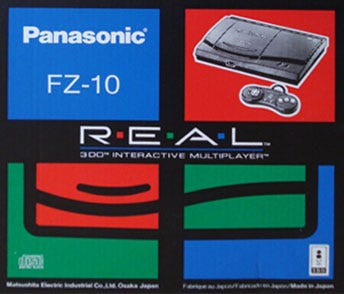Trending
Opinion: How will Project 2025 impact game developers?
The Heritage Foundation's manifesto for the possible next administration could do great harm to many, including large portions of the game development community.
With Denis Dyack and EA's Gerhard Florin recently calling for a single console platform, we asked analysts from Screen Digest, Wedbush Morgan, Creative Strategies and IDC if the idea is feasible, who would benefit, and whether the PC already qualifies, in Gamasutra's latest exclusive 'Analyze This' column.

They are the professional analysts whose job it is to research, keep track of, advise their clients, and opine to the media about the gaming business. Analyze This cuts right to the chase: rather than reporting on a subject, and throwing in quotes by analysts to support or refute a point, Gamasutra offers up a timely question pertaining to the business side of the video game industry and simply lets the analysts offer their thoughts directly to you. Each person's opinion is his own and will (probably) not necessarily agree with their fellow colleagues'.
Recently, there has been talk about the idea of a standardized game console platform -- whether this would be unified hardware specifications or development tools. This has been brought up separately by executives of two third-party developers: Silicon Knights president Denis Dyack and EA Executive Vice President and General Manager International Publishing Gerhard Florin. Other independent developers and publishers might also feel that a single developing standard would have benefits to their bottom lines (most obviously, not needing to spend the money to make the same game for more than one platform).
So we asked Ed Barton of Screen Digest, Michael Pachter of Wedbush Morgan Securities, Ben Bajarin of Creative Strategies and Billy Pidgeon of IDC:
Do you think it's possible that the video games industry will create a standardized (development or hardware) platform in the future?
How would independent developers not benefit in a market with a single gaming platform?
Isn't PC gaming already the "one gaming platform" standard? Or is this analogy not quite right?
(Special thanks to Analyze This reader Larry Asberry, Jr. for submitting this topic idea.)
 Ed Barton, Screen Digest:
Ed Barton, Screen Digest:
On whether the industry will develop a standardized gaming platform: Firstly, there is a huge amount of brand equity, in some cases built over decades, tied up in existing platforms, which the owners do not want to relinquish. The existing manufacturers generate licensing fees from third parties, and it is difficult to see them moving away from this model. Also, proprietary consoles have proven to be capable vehicles for promoting the manufacturer's other commercial interests, whether it be high-definition video or broadband delivery of content.
In addition, all manufacturers and publishers would have to agree on a hardware spec, and, given the technical differences between consoles in this generation, it would be spectacularly hard [to achieve].
It's worth remembering 3DO. Its demise tells us that all the major players must be involved in backing any such "one platform": The absence of Nintendo, Sony and Sega from the [3DO] consortium meant that serious competition was an inevitability.
On how independent developers would not benefit in a market with a single gaming platform: For a start, there would be less work available as multi-platform development would be cut. The issue then becomes whether selling more copies of a game on one platform console compensates for less work being available in general.
 It's also worthwhile considering the priorities of a global multi-platform publisher like EA. EA wants open platforms, whether these be hardware- or online-based, enabling it to offer its content to as many customers as possible [and] as cheaply as possible. Currently, EA deals with a multiplicity of different, proprietary delivery channels and devices, which lowers the margin when compared to channels EA does not have to pay a toll to.
It's also worthwhile considering the priorities of a global multi-platform publisher like EA. EA wants open platforms, whether these be hardware- or online-based, enabling it to offer its content to as many customers as possible [and] as cheaply as possible. Currently, EA deals with a multiplicity of different, proprietary delivery channels and devices, which lowers the margin when compared to channels EA does not have to pay a toll to.
On the PC already being the de facto standardized gaming platform: Despite various initiatives, [like] Games for Windows, PC gaming is a long, long way from being standardized. It is generally the cutting edge which drives industry growth, enabling publishers to charge premium prices for the latest titles.
A potentially interesting candidate is the "set top box." Already some STB's are capable of basic games playing via a remote control. Given manufacturers' recent moves with cable providers and the addition of IPTV and PVR functionality to their consoles, the trend is towards some form of convergence. Perhaps a glimpse of a potential one [gaming] platform future can be gleaned by speculating on how this market will develop. A non-proprietary version becomes a very interesting delivery channel, if it offers access to an installed base of millions of households. But existing hardware manufacturers would be motivated to offer more capable proprietary consoles and to stay near the leading edge of gaming in general.
 Michael Pachter, Wedbush Morgan Securities:
Michael Pachter, Wedbush Morgan Securities:
On whether the industry will develop a standardized gaming platform: I disagree with both [Dyack and Florin], but more power to them for wishing. Of course, it would be good for developers. And it would be good if there were one MP3 player -- wait a minute, that would be bad, since Apple would screw everyone.
The fact is, as long as Sony and Nintendo are alive and kicking, one platform will never happen. If there was one platform, the manufacturer would have all of the leverage, unless it offered open architecture. Not likely. Nintendo and Sony [would] both insist upon a proprietary standard. Microsoft has a proprietary online business. It sounds wonderful, but so does world peace.
On how independent developers would not benefit in a market with a single gaming platform: Adoption increases with choice. Do you remember the film Demolition Man? There was one restaurant chain [in the movie]: Taco Bell.
On the PC already being the de facto standardized gaming platform: The PC platform is a fair analogy. But it's been in decline for 20 years for a reason.
 Ben Bajarin, Creative Strategies:
Ben Bajarin, Creative Strategies:
On whether the industry will develop a standardized gaming platform: I do not think the industry will ever resort to one console. It would be bad for the industry. I could understand the argument for a single development standard, but not a single hardware standard. A single development standard would obviously make the lives of developers much easier and game development overall cheaper.
However, in regards to a single console, it would hinder innovation and consumer choice. I think everyone would agree that life would be pretty boring if all we had were Windows-based computers. One console in my opinion would be a step backward for the industry, not forward.
On how independent developers would not benefit in a market with a single gaming platform: I have talked with many publishers and developers and I understand the struggles they go through. However, consumers benefit when choice exists. It causes hardware and software makers to continually innovate and differentiate to stay competitive. It is those factors that contribute to the growth of an industry. At the end of the day, consumers are the ones spending the money to drive the interactive entertainment industry forward. They are the ones who need to be catered to because they are the ones really in control.
On the PC already being the de facto standardized gaming platform: This analogy for the PC is true right now because Windows is the dominant operating system. This does not mean that companies using other operating systems won't enter the market. I hear a lot of developers are either supporting or looking to support Apple. This, again, is good for the consumer. The consumer should choose the platform that fits their life best, and this is how it should be.
 Billy Pidgeon, IDC
Billy Pidgeon, IDC
On whether the industry will develop a standardized gaming platform: The idea of a single platform for the video game console industry has been kicked around nearly every video game cycle. Publishers would gain leverage over console manufacturers or forego licensing payments altogether with a collaborative organization to develop standard hardware and software specs and requirements. I don't believe such a consortium could bring about a single console system. Business models and publisher strategies are too divergent to enable agreement on a hardware platform.
EA's Gerhard Florin recently proposed that the industry could embrace a single console in 15 years. By that time, most software could be distributed over the network and network-based processing could enable less dependence on client-side processing. This could solve hardware compatibility issues and could bring immersive interactive entertainment to simpler clients like televisions, media servers and cable or satellite receivers. While the hardware differentiation will go away, proprietary networks will not.
The processing and programming would be unique to the network, so we'd likely see providers like Microsoft, Sony and Nintendo offer competing technology over the network as the client device evaporates into the home entertainment system and the convergent mobile device. We'll likely also see proprietary game networks from EA, Disney, Activision and others, connecting gamers across publishers' game libraries and proprietary networks. Business and technology models would be similar to cable television or mobile service provider models with another layer added by differentiated proprietary network processing underneath publishers' games and service providers' user networks. I hope that we also get those jetpacks we've all been waiting for.
On the PC already being the de facto standardized gaming platform: Games on PC are often disappointing for new consumers who bought devices with the expectation that the device will support any software offered by a publisher or service provider. For instance, consumers buying a PC expect to be able to play games on that PC.

This holiday's highly anticipated PC exclusive, Crysis.
If the computer has integrated graphics or out-of-date graphics hardware and cannot play a game, the owner will be unlikely to buy another game for the computer, and consumer dissatisfaction could be a problem for the PC brand as well as the game publisher. The wildly divergent hardware and software base of mobile phones has significantly worse compatibility issues than the PC. But both mobile and PC have the most to gain from realizing the promise of a unified platform and much to lose as long as the reality is write once, then port and debug everywhere.
On how independent developers would not benefit in a market with a single gaming platform: Developing for multiple platforms is painful and expensive, but dedicated platforms are hungry for content and offer a superior business market environment for third party publishers. In fact, fans of a particular franchise can be persuaded to purchase a franchise across several platforms and pay for additional downloaded content, so platform proliferation can actually be more profitable for third party publishers. Also, when publishers cover a wide range of platforms, retailers will buy larger quantities. To sum up, it's in the industry's best interests to make the unified platform promise of PC and mobile games a reality and to leverage platform differentiation on dedicated gaming devices and proprietary networks.
Got a business-related question concerning the games industry that you would like to suggest for discussion in Analyze This? Are you a professional analyst and would like to take part in this column? Email [email protected].
Read more about:
FeaturesYou May Also Like